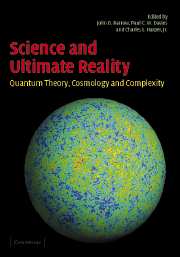Book contents
- Frontmatter
- Contents
- List of contributors
- Foreword
- Editors' preface
- Preface
- Acknowledgments
- Part I An overview of the contributions of John Archibald Wheeler
- Part II An historian's tribute to John Archibald Wheeler and scientific speculation through the ages
- Part III Quantum reality: theory
- Part IV Quantum reality: experiment
- Part V Big questions in cosmology
- Part VI Emergence, life, and related topics
- Appendix A Science and Ultimate Reality Program Committees
- Appendix B Young Researchers Competition in honor of John Archibald Wheeler for physics graduate students, postdoctoral fellows, and young faculty
- Index
Appendix B - Young Researchers Competition in honor of John Archibald Wheeler for physics graduate students, postdoctoral fellows, and young faculty
Published online by Cambridge University Press: 29 March 2011
- Frontmatter
- Contents
- List of contributors
- Foreword
- Editors' preface
- Preface
- Acknowledgments
- Part I An overview of the contributions of John Archibald Wheeler
- Part II An historian's tribute to John Archibald Wheeler and scientific speculation through the ages
- Part III Quantum reality: theory
- Part IV Quantum reality: experiment
- Part V Big questions in cosmology
- Part VI Emergence, life, and related topics
- Appendix A Science and Ultimate Reality Program Committees
- Appendix B Young Researchers Competition in honor of John Archibald Wheeler for physics graduate students, postdoctoral fellows, and young faculty
- Index
Summary
A “Young Researchers Competition” was held in conjunction with the Science and Ultimate Reality symposium that took place in Princeton, New Jersey, USA, in March 2002. Like the entire Science and Ultimate Reality program, the competition was focused on the future of innovative research into the nature of “quantum reality” and related challenges inspired by Wheeler's “Really Big Questions” (see the Editors' Preface at the front of this book).
Of the 64 original applicants who submitted abstracts in an open competition worldwide, the applications of the 15 young research scientists born on or after January 1, 1970 that were chosen as finalists demonstrated work that is innovative and substantively engaged with the ideas raised by Wheeler's questions related to quantum reality. They also, therefore, related to one or more of the four main themes on which both this book and the symposium were based. The finalists made their presentations in 12-minute time slots (8 minutes plus 4 minutes for questions and answers) at the symposium on Sunday, March 17, 2002.
After evaluating the finalists' research accomplishments, records of achievement, and symposium presentations, appointed judges selected from among the symposium participants (all of whom contributed chapters to this volume) awarded eight prizes, six of $5000 each and a first-place prize of $7500 shared by the top two presenters, on the last day of the symposium on Monday, March 18.
- Type
- Chapter
- Information
- Science and Ultimate RealityQuantum Theory, Cosmology, and Complexity, pp. 694 - 696Publisher: Cambridge University PressPrint publication year: 2004



